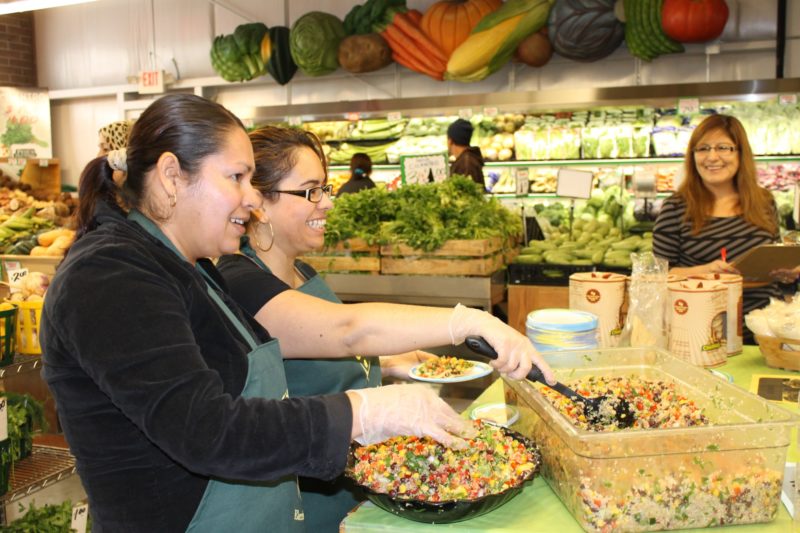
Share On Social!
When clinic worker Tatiana Maida had trouble finding many healthy products in the small grocery stores in her Latino neighborhood in Milwaukee, she decided to do something about it. She teamed up with concerned parents, dietitians academics, and store owners to launch a group dedicated to bring baked snacks,hormone-free milk, antibiotic-free eggs, and nutritious grains and seeds into the community’s food environment. When this team of people from all walks of life worked together, they were able to infuse healthy food options into the neighborhood.
EMERGENCE
Awareness: About 80% of the patients at the Sixteenth Street Community Health Center (SSCHC) in Milwaukee’s South side neighborhood are Latinos. 77% of the adult patients are either obese or overweight, and frequently struggle with obesity and related conditions, like diabetes, said Tatiana Maida, the clinic’s Healthy Choices department manager..
Maida noticed a big reason for this: residents didn’t have many health eating options.
And she wasn’t the only one who could see the problem.
“[Customers] come in and buy pizza and Fritos and ice cream,” said Ernesto Villarreal, who runs Supermercado El Rey. “It’s really hard to make them change.”
Martha Cuenca, a clinic patient and Mexican immigrant mother, said local families make poor eating decisions because they lack options.
“Many families have no time to cook and so they go get fast-food,” said Cuenca, who also noted that the cultural belief that chubbier children are healthier contributes to the issue.
Cuenca signed up for the clinic’s Healthy Choices program when she saw a flyer during a visit to the clinic.
The clinic’s Healthy Choices program educates parents about healthy eating and physical activity. Select graduates of the 3 month program are invited to be part of Latinos por la Salud, a community health advocacy group that has the mission of expanding health education and increasing healthy options in the community. Maida called Cuenca, about a year after she completed the program, to ask her to join the group. Cuenca says that she didn’t waste a second and signed up that very night.
“I wanted to fight for a better quality of life for Latinos in the community,” Cuenca said.
But the group was running into a problem.
Graduates couldn’t find the healthy foods they were learning about, like whole-wheat flour or quinoa, in their local grocery stores.
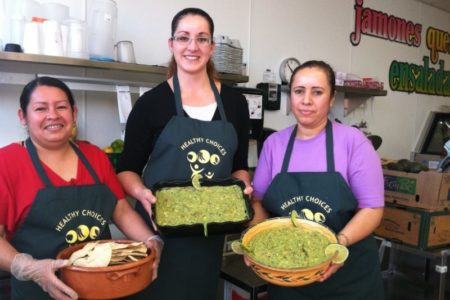
Source: Tatiana Maida (PHOTO CREDIT: ERIN BLOODGOOD)
“We teach about the importance of whole grains and seeds such as quinoa or sesame, but those would be available only in natural food stores in other neighborhoods” Maida said.
Maida and Latinos por la Salud decided to find out why their local small grocery stores weren’t carrying certain healthy foods.
Learn: In early 2012, SSCHC conducted an availability and price assessment of 50 food items in eight different grocery stores in the neighborhood. The foods that were chosen were the ones they had been learning about in the nutrition education classes, which included whole grains and seeds such as quinoa, sesame, and flax.
The results showed that many different types of fruits and vegetables were offered at the stores, probably because fruits and vegetables are very important to Latino food dishes.
However, Maida says that if a person wanted a whole-grain cereal, bread free of high fructose corn syrup, or healthy grain alternatives, they simply weren’t offered. Additionally, the healthy items generally cost more, the study found.
Frame Issue: The group was troubled by the lack of choices in their local stores.
“We need all the healthy options in this neighborhood,” Maida said. “Latinos like to shop at the local markets, particularly at Pete´s and El Rey, and if the healthy choices aren’t there, they are going to buy some unhealthy stuff or will have to go to other neighborhoods to buy what they are looking for.”
The group decided to try to work with stores to add healthier food options.
DEVELOPMENT
Education/Mobilization: Maida knew that to get the full attention of local grocery stores, Latinos por la Salud would need some help.
While Latinos por la Salud was starting their planning process to connect with grocery stores, a group of organizations were forming a food coalition in the neighborhood and looking for a project to push forward. The timing was perfect for the groups to start working together.
The food coalition, later named Southside EAT (Empowerment, Access, Transformation) Coalition, was formed by several organizations including Community and Regional Food Systems Project, run by the University of Wisconsin-Madison, UW Milwaukee County Cooperative Extension, CORE-El Centro, SSCHC and Center for Urban Populations and Health.
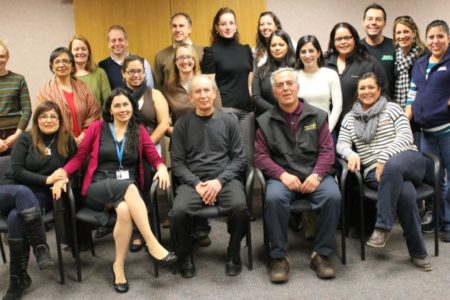
Source: Tatiana Maida (PHOTO CREDIT: ERIN BLOODGOOD)
This coalition was excited about Madia’s pitch and wanted to help Latino Por Salud work with grocery stores to offer a better variety of health foods.
But the academic and community groups spoke different languages—literally.
“Most people in the community group are Spanish-speaking only,” said Maida, “…because of the language we couldn’t have meetings together [with the academic group].” So Maida took on a role as interpreter and attended meetings with both the big organizations and Latinos por la Salud.
Debate: The Wisconsin-Madison team and the community group tackled the challenge from different perspectives. Latinos por la Salud were set on asking the grocery stores for whole-grain bread that was not made with high-fructose corn syrup, but the academic dieticians thought it was not necessary to go that far.
Maida stood her ground, restating that having options was important to the community. “It was about options, it wasn’t about the ingredient itself,” she said. Eventually, the dieticians agreed and the groups continued to fine-tune the requests for the stores.
After more discussions, the coalition decided to work with two local grocery stores that are staples in the community, Pete’s Fruit Market and Supermercado El Rey.
ENACTMENT
Activation: Before they met with the grocery store owners, Latinos por la Salud prepared what they would say and what exactly they would ask of the owners.
They created a pamphlet that listed the new items they wanted to see in stores, as well as other healthy changes that local businesses were making and why the new items would benefit the store and the community.
Frame Policy: When Maida, a community member, and someone representing the Wisconsin-Madison team met with each store to make their requests, they wanted to frame it in a positive way. Instead of pointing out the lack of options the store had, Maida says they told the stores how strong and respected they were in the community, how they have been leaders in providing fresh fruits and vegetables.
“We need to take the next steps; some items are missing,” she told them.
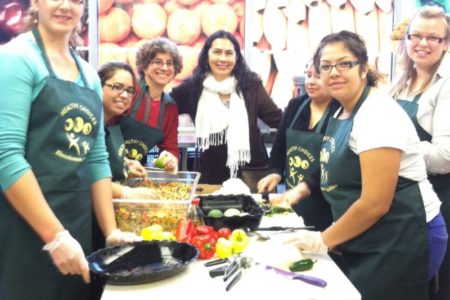
Source: Tatiana Maida (PHOTO CREDIT: ERIN BLOODGOOD)
And the owners wouldn’t be taking those next steps alone.
The researchers from the Community and Regional Food Systems Project had connections with food distributors that could help provide the new options. Latinos por la Salud, supported by SSCHC was more than willing to provide cooking demonstrations and nutrition education in the stores when the new products were launched. Together, they could all help the grocery store make a healthy change for the neighborhood.
Change: Both Pete’s and El Rey agreed to participate.
Both stores now stock:
• Whole grain breads, cookies, crackers, and cereals without high fructose corn syrup
• Whole wheat flour
• Seeds: quinoa, sesame, and
• Non-fat/low-fat milk and dairy
• Cage free eggs without antibiotics
• Baked chips.
Both owners agreed that if their loyal customers wanted to see these changes, it was in the stores’ best interest to provide them. “I thought it was a real good idea to change the habits of the customers,” said Villarreal of the El Rey store. “It was a great win-win situation for both,” said Martha Tsitiridis, who helps run her father’s store, Pete’s.
Latinos por la Salud held up their end of the deal. They held cooking demonstrations at the two stores, passing out recipe cards in English and in Spanish.
The store owners learned that all of the new items could be obtained from their current suppliers, which simplified things for them. With help from the EAT Coalition, they even made some new connections. Tsitiridis said that they were hooked up with a local farmer who now provides their supply of hormone-free milk.
IMPLEMENTATION
Implementation: Cuenca volunteered at every cooking demonstration. She says that people were hesitant to try the new food options, but once they did and once she told them about the health benefits, they usually were happy to bring some home.
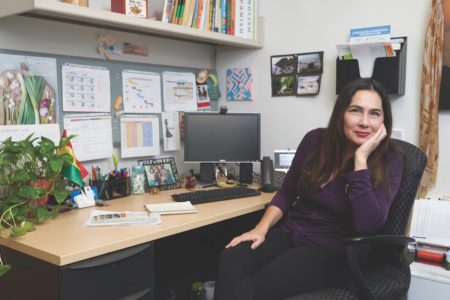
Latinos por la Salud also developed “shelf-talkers,” little stickers placed by the healthier items on the shelves, alerting customers that these were new healthy options. Maida says that those weren’t so successful because they were easy to miss, but that bigger posters drew more attention.
Equity: Making sure the new offerings were affordable was important to the community, and the store owners are in it for the long haul, so they continue to ensure that the prices are affordable for everyone.
Villarreal says it’s not going to be easy to change families’ eating habits, but that if you can get the mom or dad trying new things, the kids tend to follow.
Sustainability: Both stores want to continue to find ways to make it easier for customers to make healthy choices. They agree that the cooking demonstrations have been key to enticing customers to try the new items, so they want to keep having more.
And Latinos Por la Salud want to stay engaged with both groceries, says Maida. In fact, both stores are set to do more cooking demos before the end of 2013.
At El Rey, they’ve proudly introduced a quinoa salad in the deli. “The quinoa salad is a daily staple item in our deli that we offer, we make fresh salads every day…it’s become very popular,” Villarreal said.
Villarreal knows it will take time, but he hopes small changes in the grocery store can help families care more about their health. “The way I see it, when you want to exercise, you want to eat healthy too; it goes together,” he said. He is also hoping to bring in more baked, not fried, products in the future.
Pete’s owners were happy to add seeds and grains along with their existing fresh fruit and vegetable options. Tsitiridis says they are sure to keep the new healthy items at eye level, which makes it more likely that customers will grab them rather than less healthy food.
Maida is proud that Latinos Por la Salud can recognize and address the needs of their community. “One of the most important things about this project was that the community’s voice was heard and their actions were supported and enhanced by organizations and businesses. That doesn’t happen all of the time”, she said.
This success story was produced by Salud America! with support from the Robert Wood Johnson Foundation.
The stories are intended for educational and informative purposes. References to specific policymakers, individuals, schools, policies, or companies have been included solely to advance these purposes and do not constitute an endorsement, sponsorship, or recommendation. Stories are based on and told by real community members and are the opinions and views of the individuals whose stories are told. Organization and activities described were not supported by Salud America! or the Robert Wood Johnson Foundation and do not necessarily represent the views of Salud America! or the Robert Wood Johnson Foundation.
ABOUT THE PROGRAM
Salud America! The RWJF Research Network to Prevent Obesity Among Latino Children is a national program of the Robert Wood Johnson Foundation. The program aims to educate researchers, decision-makers, community leaders, and the public in contributing toward healthier Latino communities and seeking environmental and policy solutions to the epidemic of Latino childhood obesity. The network is directed by the Institute for Health Promotion Research at the University of Texas Health Science Center at San Antonio.
For more information, visit http://www.salud-america.org.
By The Numbers
1
Supermarket
for every Latino neighborhood, compared to 3 for every non-Latino neighborhood
This success story was produced by Salud America! with support from the Robert Wood Johnson Foundation.
The stories are intended for educational and informative purposes. References to specific policymakers, individuals, schools, policies, or companies have been included solely to advance these purposes and do not constitute an endorsement, sponsorship, or recommendation. Stories are based on and told by real community members and are the opinions and views of the individuals whose stories are told. Organization and activities described were not supported by Salud America! or the Robert Wood Johnson Foundation and do not necessarily represent the views of Salud America! or the Robert Wood Johnson Foundation.



